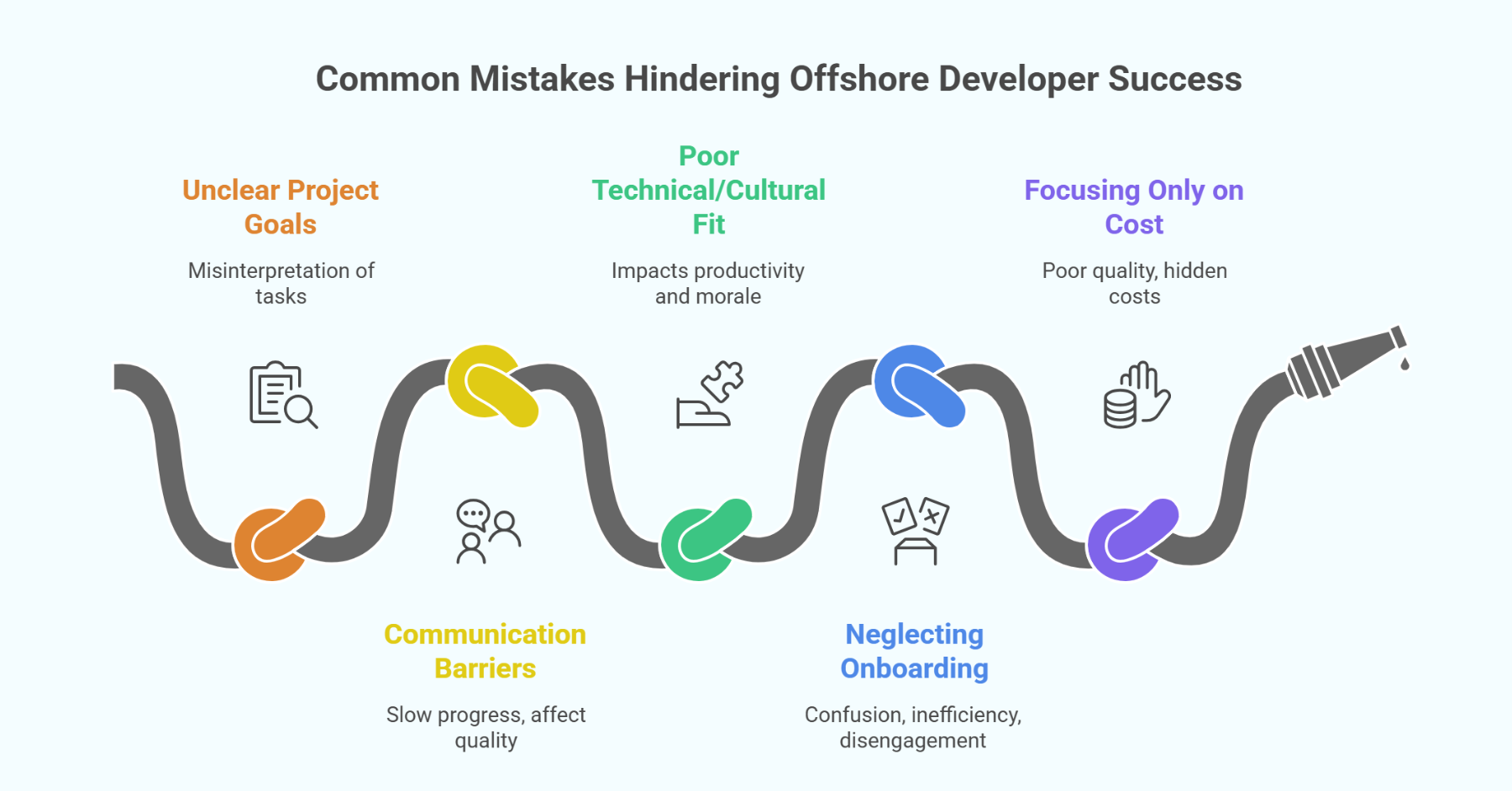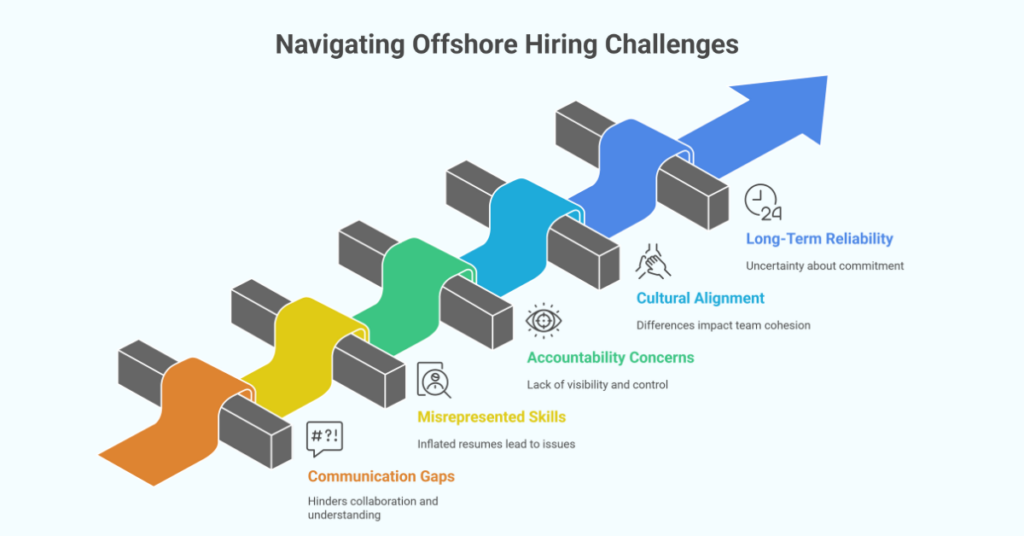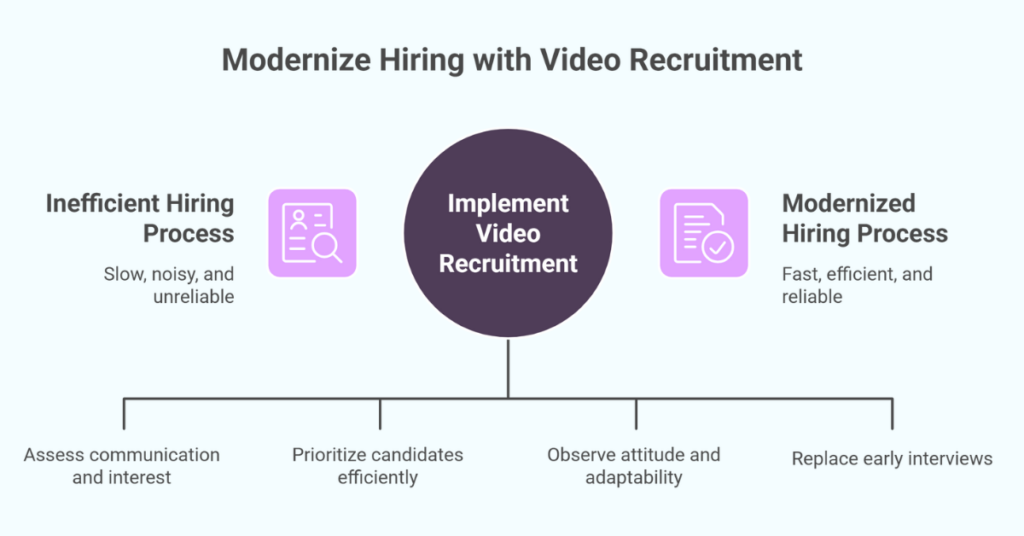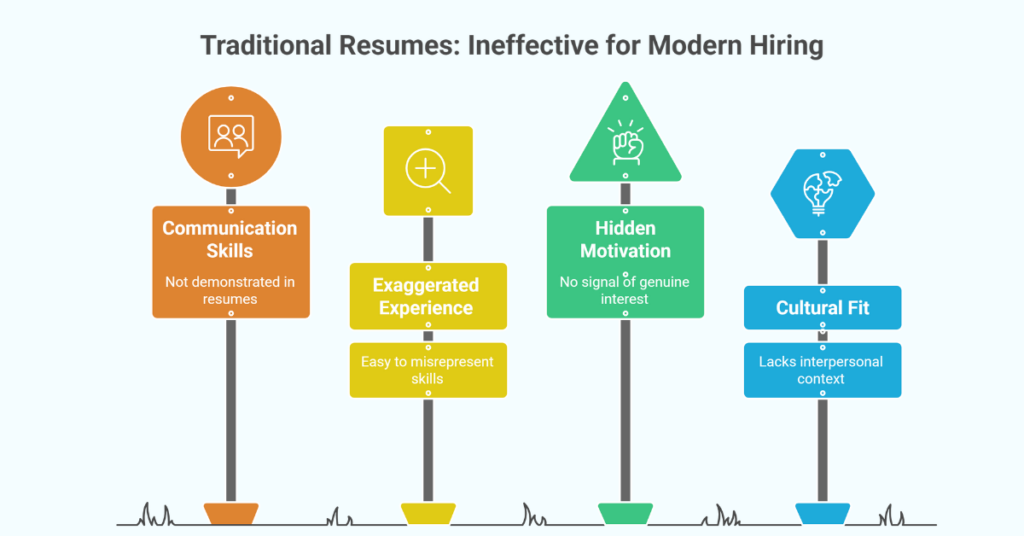When you hire offshore developers, avoiding common mistakes can save time, money, and ensure a smoother collaboration for your global tech projects.
Hiring offshore developers has become a strategic move for companies looking to cut costs, scale faster, and access world-class talent. Whether it is building software, managing data systems, or developing new applications, offshore developers can bring exceptional value to your organization. However, hiring offshore talent requires careful planning, communication, and management. Many companies fail to maximize the benefits of offshore development simply because they overlook key steps in the hiring and collaboration process.
When you hire offshore developers without clear expectations, cultural understanding, or structured project management, it can lead to miscommunication, delays, and budget overruns. The good news is that these pitfalls are entirely avoidable with the right approach.
In this article, we will explore five common mistakes businesses make when hiring offshore developers and share practical ways to prevent them. Whether you are a startup or an enterprise, understanding these challenges will help you build a strong, efficient, and reliable offshore development team.
1) Not Defining Project Goals and Requirements Clearly
One of the most common mistakes companies make when hiring offshore developers is failing to provide clear project objectives and expectations. Without a detailed scope of work, developers may interpret tasks differently, leading to misaligned outcomes.
Before onboarding your offshore team, create a comprehensive project brief that outlines deliverables, timelines, performance indicators, and communication protocols. Clear documentation ensures everyone understands their roles and responsibilities. Regular updates and progress checkpoints also help maintain alignment throughout the project. By defining project goals precisely, you set the foundation for success and prevent costly misunderstandings.
2) Ignoring Time Zone and Communication Barriers
Working across time zones can be both an advantage and a challenge. When not managed properly, communication gaps can slow progress and affect project quality. Many businesses underestimate how critical real-time collaboration is for offshore teams.
To overcome this, establish overlapping working hours for meetings and project reviews. Use collaborative tools like Slack, Trello, or Asana to ensure continuous visibility into project status. Encourage open communication and cultural awareness among teams. When you hire offshore developers, prioritizing communication and scheduling consistency creates a more cohesive, productive work environment despite geographical distances.
3) Overlooking Technical and Cultural Fit
Hiring offshore developers based solely on technical skills can lead to long-term issues. While coding expertise is important, understanding the company’s culture, work ethics, and collaboration style is equally essential. A mismatch in values or communication styles can impact productivity and team morale.
To ensure the right fit, include behavioral and situational interviews along with technical assessments. Evaluate how candidates handle challenges, deadlines, and feedback. Working with developers who align with your company’s mission and culture improves trust and teamwork. The best offshore hires are not just skilled programmers but partners who contribute to your business vision.
4) Neglecting Proper Onboarding and Project Management
A strong onboarding process is vital to integrating offshore developers into your workflow. Some companies make the mistake of skipping structured onboarding, assuming developers will “figure it out.” This can lead to confusion, inefficiency, and disengagement.
Provide new hires with access to all necessary tools, resources, and documentation. Assign mentors or project leads who can guide them during the first few weeks. Additionally, use agile project management methods to monitor progress, delegate tasks, and adjust goals as needed. Regular performance reviews and check-ins help maintain accountability and alignment across global teams.
5) Focusing Only on Cost Instead of Value
While cost savings are one of the main reasons companies hire offshore developers, focusing solely on the lowest price can backfire. Cheap development often leads to poor-quality code, rework, and hidden costs that outweigh initial savings.
Instead, focus on long-term value. Evaluate candidates based on experience, reliability, and ability to deliver scalable solutions. Investing in skilled offshore talent ensures better code quality, faster delivery, and higher ROI. Remember, the goal is not just to save money but to build a sustainable partnership that adds real business value.
Remote Recruit Solutions for Employers and Job Seekers
Remote Recruit makes hiring offshore developers easy, affordable, and efficient. For employers, the platform offers access to a global network of pre-vetted developers across various technologies and skill levels. With advanced AI matching, video interviews, and compliance support, Remote Recruit ensures you find the right talent quickly without compromising on quality or security.
For job seekers, Remote Recruit provides verified opportunities with international employers. Developers can showcase their expertise through video-based profiles, highlight technical achievements, and connect directly with hiring managers. The platform bridges the gap between global talent and businesses by offering transparency, trust, and a seamless recruitment experience.
By leveraging Remote Recruit, companies can hire offshore developers confidently, build high-performing teams, and scale projects globally with reduced risk and cost.
Conclusion
Hiring offshore developers can be a game-changer for businesses seeking scalability and efficiency. However, success depends on how well you manage the process. By avoiding common mistakes like unclear requirements, poor communication, or prioritizing cost over value, you can build a productive and reliable offshore team.
A well-planned offshore hiring strategy helps companies innovate faster, expand globally, and stay competitive. The key is to treat offshore developers as an integral part of your organization, not just outsourced talent. When you combine clarity, collaboration, and the right platform, the results can be extraordinary.
Remote Recruit helps employers and developers connect on a global scale. Whether you are looking to expand your tech team or explore remote job opportunities, the platform provides everything needed for a successful offshore collaboration.
Frequently Asked Questions
1. What are the benefits of hiring offshore developers?
Hiring offshore developers helps companies reduce costs, access global talent, and scale projects faster without compromising quality.
2. How can I ensure communication efficiency with offshore teams?
Use collaboration tools, schedule overlapping hours, and maintain regular check-ins to ensure clear and consistent communication.
3. What should I look for when hiring offshore developers?
Focus on technical expertise, communication skills, and cultural fit to ensure smooth collaboration and high-quality results.
4. How does Remote Recruit simplify offshore hiring?
Remote Recruit connects you to pre-vetted offshore developers, streamlines interviews, and ensures compliance with international hiring regulations.
5. Is hiring offshore developers cost-effective for startups?
Yes. Offshore hiring allows startups to scale affordably by accessing skilled developers from global markets at lower operational costs.
